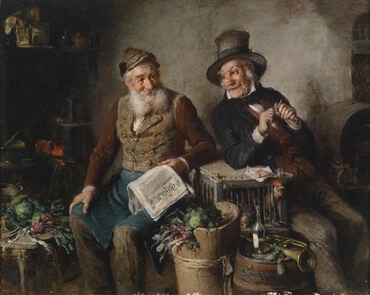32. I, John, who am also your brother and companion. (1:9) This symbolizes those people who possess the goodness of charity and consequent truths of faith.
The Apostle John represented those people who possess the goodness of charity, as we said in no. 5 above, and people who possess the goodness of charity also possess truths of faith, since charity is the soul and life of faith.
It is because of this that John calls himself the brother and companion of the people in the church to whom he was writing, for he was writing to the seven churches. In the spiritual sense of the Word a brother means someone who possesses the goodness of charity, and a companion someone who for that reason possesses truths of faith. For people are all as though blood relatives through charity, and relatives by marriage through faith. That is because charity unites, but not so much faith unless it springs from charity. When faith springs from charity, then the charity unites and the faith affiliates. Moreover, because the two go together, therefore the Lord commanded all to be brothers; for He said,
...One is your Teacher, the Christ, while you are all brethren. (Matthew 23:8)
[2] The Lord also calls those brothers who possess the goodness of charity or goodness of life. He said,
My mother and My brothers are these who hear the Word of God and do it. (Luke 8:21; cf. Matthew 12:49, Mark 3:33-35)
Mother means the church, and brothers those who possess charity. Moreover, because the goodness of charity is "a brother," therefore the Lord names those who possess it His brothers (see also Matthew 25:40); and so likewise the disciples (Matthew 28:10, John 20:17). But we do not read that the disciples called the Lord brother, because "a brother" is the goodness that emanates from the Lord. It is comparatively like the case of a king, prince, or eminent person, who calls his relatives by blood and marriage brothers, even though they do not call him so in return. For the Lord says,
...One is your Teacher, the Christ, while you are all brethren. (Matthew 23:8)
And so, too:
You call me Teacher and Lord, and you say rightly, for so I am. (John 13:13)
The children of Israel called brothers all those who were descended from their ancestor Jacob, and in a wider sense those also who were descended from Esau. But people not descended from those ancestors they called companions.
However, because in its spiritual sense the Word deals only with people who are in the Lord's church, therefore in that sense brothers mean those who possess the goodness of charity emanating from the Lord, and companions those who possess truths of faith, as in the following passages:
Thus every one of you shall say to his companion, and every one to his brother, "What has Jehovah answered?" (Jeremiah 23:35)
You have not (proclaimed) liberty, every one to his brother and every one to his companion. (Jeremiah 34:17)
Let him not press his companion or his brother... (Deuteronomy 15:1-2)
For the sake of my brethren and companions, I will... say... (Psalms 122:8)
Everyone helps his companion, and says to his brother, "Be strong!" (Isaiah 41:6)
And in an opposite sense:
Everyone beware of his companion, and do not trust in any brother; ...every brother... supplants, and every companion slanders. (Jeremiah 9:3)
I will embroil Egypt with Egypt; each will fight against his brother, and... against his companion... (Isaiah 19:2)
And elsewhere.
I have adduced these particulars to make known why John calls himself a brother and companion - that in the Word a brother means one who possesses charity or goodness, and a companion one who possesses faith or truth.
Still, because charity is the foundation from which faith springs, therefore the Lord does not call anyone a companion, but a brother or neighbor. Everyone also is the neighbor in accordance with the quality of his goodness (Luke 10:36-37 1
).
Poznámky pod čarou:







